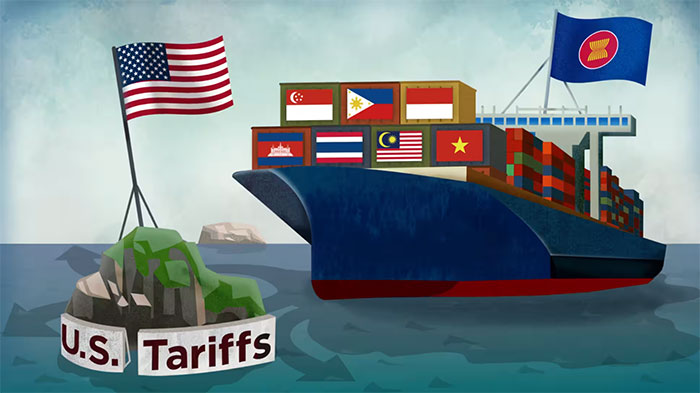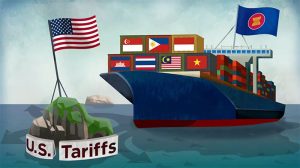US-China Tariffs & PH SMEs
Effects of US Tariffs on Philippine Small Businesses
Philippine small businesses are vital contributors to the nation’s economy. Many of these businesses actively participate in international trade. They source products from various countries to serve the local market. China has become a major source of goods for Filipino entrepreneurs. This is especially true for those involved in dropshipping and local distribution. However, global trade dynamics are complex. The trade relationship between the United States and China has experienced significant shifts. US tariffs on Chinese exports to the US have created ripples across the globe. This article examines the effects of these tariffs. It will focus specifically on Philippine small businesses. It will also look at dropshipping and the distribution of Chinese products within the local Philippine market.
Understanding the US-China Trade Dispute
The United States and China, as two of the world’s largest economies, engaged in a significant trade dispute. This dispute
centered on the imposition of tariffs on a wide range of goods traded between the two nations. The US government placed tariffs on numerous Chinese imports. China responded by imposing its own tariffs on US products. These actions stemmed from a desire to protect domestic industries. Policymakers also aimed to address perceived trade imbalances. The consequences of this trade dispute extended far beyond the borders of the US and China. They have reshaped global trade patterns.
Impact of China Tariffs on Global Trade Dynamics
The US-China trade dispute disrupted established global supply chains. Many businesses worldwide rely on these intricate networks. They obtain raw materials or finished goods from China. The tariffs increased the cost of these goods. This, in turn, affected their competitiveness in the international marketplace. This situation compelled businesses to seek alternative suppliers. It also triggered shifts in international trade flows. The dispute introduced a significant degree of uncertainty. This uncertainty affected investment decisions across various sectors. It also cast a shadow over global economic growth projections.
Effects on Philippine Small Businesses
Philippine small businesses have felt the impact of these trade tensions. A significant number of these enterprises source products from China. They do this because of the competitive pricing and wide availability. The increased cost of Chinese goods due to China Tariffs directly affects these businesses. This is particularly true for those engaged in Drop shipping. These businesses often operate on relatively thin profit margins. Increased costs can substantially erode their profitability.
Local distributors in the Philippines also face considerable challenges. They import Chinese products in bulk. They then supply these products to retailers and consumers throughout the archipelago. The tariffs imposed by the US, while directed at US imports, affect the global pricing and availability of Chinese goods. This, in turn, influences the prices these distributors pay. Filipino consumers ultimately bear the burden of these increased costs. This can lead to decreased demand for certain products.
Impact on Dropshipping Operations
Dropshipping has emerged as a popular business model among Filipino entrepreneurs. It allows individuals to sell products online without the need to maintain a physical inventory. Many Filipino dropshippers rely heavily on Chinese suppliers. Platforms like AliExpress and Alibaba facilitate connections with these suppliers. However, the US tariffs on Chinese goods create a complex situation for these dropshippers.
The higher cost of Chinese products reduces potential profit margins. Dropshippers face the difficult choice of increasing their prices. However, this can make their offerings less competitive in the market. Another option involves absorbing the increased costs. This would lead to a direct reduction in their earnings. Consequently, many dropshippers are actively exploring alternative sourcing strategies. This may involve identifying suppliers in other countries. Some may shift their focus towards promoting and selling locally sourced products.
Impact on Local Distribution Networks
Philippine retailers depend on efficient local distribution networks. Distributors play a crucial role in importing and supplying a wide range of Chinese goods. These goods encompass diverse categories, from electronics and clothing to household items and consumer goods. The China Tariffs imposed by the US, while targeting US-bound exports, ripple through the entire supply chain. Distributors encounter higher import costs. These increased costs are subsequently passed on to retailers. Retailers, in turn, transfer these costs to the final consumers.
This chain reaction of price increases can have several negative consequences. Filipino consumers may curtail their spending. They might actively seek out cheaper alternatives. This could lead to increased demand for locally manufactured products. Retailers may also reduce their order volumes from distributors. This, in turn, would result in lower sales volumes and revenues for distributors. The long-term implications could involve a significant shift in consumer preferences. It might also lead to restructuring within the local retail market.
Challenges and Opportunities for Businesses
The US tariffs on Chinese exports present both challenges and opportunities. Philippine small businesses face several key challenges:
- Increased costs of goods
- Reduced profit margins
- Intensified price competition
- Disruptions in supply chains
- Heightened market uncertainty
Conversely, these changes also create potential opportunities:
- Diversification of sourcing strategies
- Stimulation of local industry development
- Increased demand for domestic products
- Fostering innovation in business models
- Exploration of untapped market segments
Strategies for Adapting to the New Landscape
Philippine small businesses must adapt proactively to this evolving trade environment. Effective adaptation strategies include:
- Diversifying supplier base: Businesses can lessen their dependence on China. They can explore sourcing options within ASEAN. Countries like Vietnam, Indonesia, and Thailand present viable alternatives.
- Strengthening domestic production: The tariffs can incentivize the growth of local industries. The government can play a key role. It can provide incentives and support to local manufacturers.
- Enhancing business competitiveness: Businesses can focus on improving operational efficiency. They can also differentiate themselves by offering unique value.
- Embracing digital commerce: Expanding online presence can help businesses reach wider audiences. It can also help them streamline operations and reduce overhead.
- Exploring new export markets: Businesses can seek out new international markets. This diversification can help offset reduced demand in affected regions.
The Crucial Role of Government Support
The Philippine government plays a vital role in helping small businesses navigate these challenges. Implementing policies that promote diversification is essential. Providing support for local industries is also crucial. The government can negotiate favorable trade agreements. These agreements can help open new markets for Filipino products. Access to affordable financing and skills training can also empower businesses to adapt.
Conclusion
The US China Tariffs on exports, while primarily directed at the US market, have significant repercussions. These repercussions are felt by Philippine small businesses, particularly those involved in dropshipping and local distribution. While these tariffs present undeniable challenges, they also create new opportunities. Philippine small businesses must demonstrate resilience and adaptability. The government must provide the necessary support. By embracing these changes, these businesses can not only survive but also thrive. They can contribute to the continued economic growth and prosperity of the Philippines.
Keywords/Keyphrase:





This Post Has 0 Comments